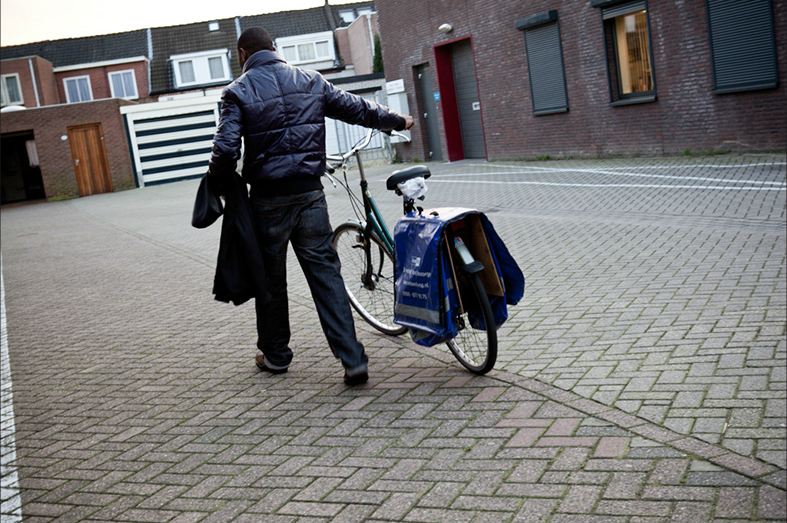When Nigerian-born illegal, Timothy, couldn’t feed himself, he approached the Dutch food bank. But because he was an illegal, he was refused
Every Thursday, Osaror Timothy rides his bicycle to dispatch 2,600 newspapers to the same number of homes in Tilburg, a Dutch city of over 200 thousand people. Dark and of average height, Timothy’s major problem is not the delivery of the papers, but evading police arrest.
Timothy’s fear of arrest is not borne out of committing any immediate crime, but because his stay in the Netherlands is un-official. By Dutch law, he is an illegal immigrant.
“Each day I move on the streets, I move with the fear of getting arrested by the police,” he said.
Illegals
Timothy is one of the 100,000 illegals living in the Netherlands. Although official statistics are unavailable for this category of people (illegals are not captured in official statistics), the Dutch Ministry of Justice and Security estimates that 100,000 illegals were in the Netherlands as at 2009. Citizens of Sub-Saharan African countries (including Nigeria) make up 23 per cent of that figure.
These categories of people lack the necessary documents to live in the country. Not only are they not entitled to live, they can also not legally work, get accommodation and health insurance.
This is in contrast with the 10,000 Nigerians who according to the Dutch Bureau of Statistics, live in the Netherlands legally. This is a 300 per cent increase from the over 3000 that lived in the country in 1996.
Timothy’s story
Born 28 years ago in Benin, Timothy arrived in the Netherlands in January 2007. He sought asylum claiming to be a member of a youth group called END in the oil producing Niger Delta region of Nigeria. Timothy claims that his group was wrongly linked to the militant group MEND (Movement for the Emancipation of the Niger Delta) and that the Nigerian Government was persecuting them. MEND claimed responsibility for the October 1, 2010 independence day bomb blast in Nigeria’s capital, Abuja that killed eight people.
“I can’t go back to Nigeria; in Nigeria, I am considered an enemy of the state,” he said.
Aduro or Asylum
Aduro is a Yoruba (South Western Nigeria) word which literally means “someone who stays or remains.” It is the term Nigerians who stay(ed) in European asylum camps use to refer to a person who is allowed to stay at the camps; or to refer to permission to stay at the camp itself. Terms like “So ti je aduro,” “have you been given permission to stay at the camp is common among Nigerian illegals in the Netherlands.
Foreigners who want to seek asylum are taken to a detention centre, and then to an application centre. After several interviews, those whose stories appear believable pending investigation are allowed into one of the 45 asylum camps (aduro), while those whose applications are refused are instantly deported to their home countries.
Though not rosy, life at the Asylum Camp is not terrible, Timothy says.
“You stay two in a room, we are paid 55 euro (N12, 000) every Thursday, and are given something like an ID card with which to move around the country.”
Refugee camp residents wait for their asylum status. The wait could keep them there for up to two years during which time the Dutch authorities determine if they should be granted asylum or not. Those who are granted are given legal status to live and work in the Netherlands, while those not given are either deported or continue to live as illegals hiding from authorities.
Timothy spent the maximum two years at the asylum camp. Dutch Authorities eventually rejected his application and he was asked to leave the country in 2009.
“I was asked to leave the camp and leave the country. I was given a letter to leave the Netherlands,” Timothy said.
Life as an illegal
Timothy left the Asylum camp not wanting to be deported to Nigeria. He lived on the streets for four months feeding from the little he saved while at the camp before he met a friend in Church. He lived with his friend for another three months.
Getting a job is very difficult for illegals as Dutch law does not allow it. Individuals and companies that employ illegals do so secretly. Timothy got his first job while living with a friend. A devout Christian, he says he got the job by “divine intervention.” He began distributing papers to earn 60euro (N12, 600) a month.
When he got a wider opening to distribute more papers, he grabbed it and began distributing the 2600 papers.
“I work from 6.30am to 9.30pm every Thursday,” he says.
The monthly minimum wage in the Netherlands is about 1,400euro (N294, 000), but Timothy earns less than 20 percent of that, 220euro (46,200) per month.
Timothy does not know how much he should actually earn for the job he does.
His friend who helped him get the job collects the money and pays him the 220 euro. Several illegals get their job this way. He is however not bordered about finding out if his friend is cheating him.
“I am happy I can even earn some money. There are many like me who cannot work to earn anything. In any case, who do I report to,” Timothy says, while lamenting that as an illegal, he cannot even report a crime for fear of deportation.
From his earnings, the Benin-born Nigerian pays a rent of 200euro for his small apartment which he rented from someone he met in Church.
“My friend was treating me like a slave, so I had to get my own place,” Timothy said.
When asked how he survives on 20 euro a month, Timothy answered “I live to pay my bills, not to feed. But it’s God that keeps me alive.”


No comments:
Post a Comment